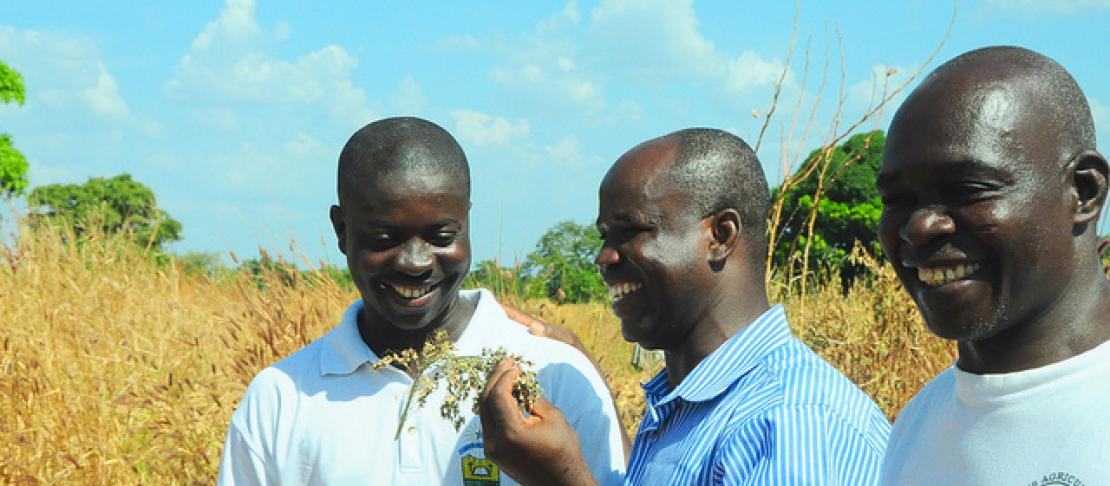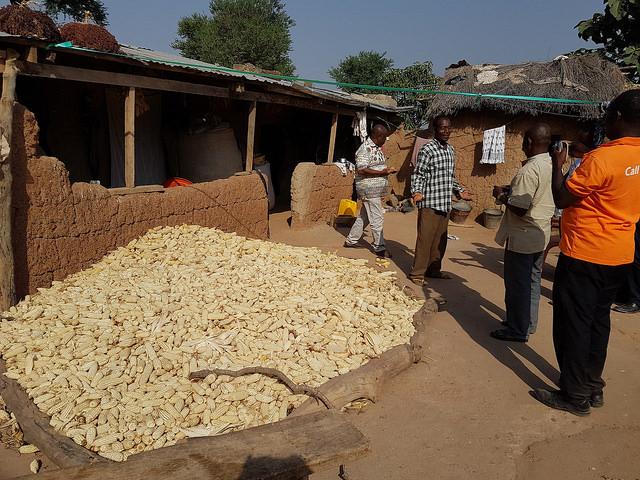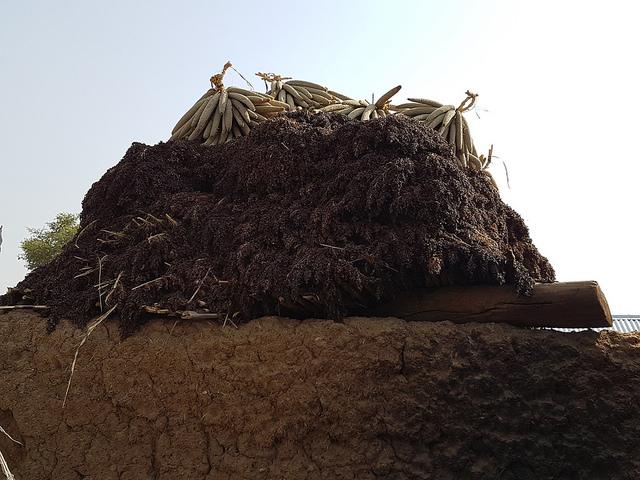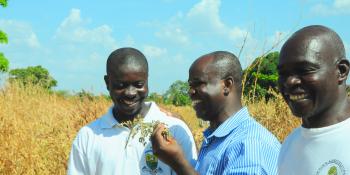How the Climate-Smart Village approach impacts farmers' livelihoods in Ghana

The Climate-Smart Village approach has increased food security and livelihood resources of farmers in Bompari, Ghana.
With the coming presidential and parliamentarian elections in Ghana, most rural areas are stormed by politicians who are campaigning to obtain communities’ votes. It is in this pressure-filled environment that the CGIAR Research Program on Climate Change Agriculture and Food Security (CCAFS) West Africa and the The Council for Scientific and Industrial Research –Savanna Agricultural Research Institute (CSIR SARI-WA) teams paid a visit to the Climate-Smart Village (CSV) of Bompari on 18 November. The visit was not to campaign for a political party, but instead to hear from village community members how activities implemented since 2012 to develop a CSV have impacted their livelihoods.

Mr. Dery Christopher, an innovative farmer involved in the CSV activities, explaining his experience with Esoko. Photo: R. Zougmore (CCAFS)
With both men and women groups, and the wise presence of the village chief, the discussions started with community members expressing their views on the CCAFS activities. Community members spoke openly and authoritatively about their own experiences with CCAFS-led agricultural activities. For example, one community member said, "before CCAFS intervened here in Bompari, we were mainly planting sorghum using mounds, but with CCAFS' intervention, we're now cultivating maize and soybean using tied ridges and planting now in rows”. Another one expressed:
Since the CCAFS project started here in Bompari, crop yields have substantially increased, thus improving our food security”.
Others, especially women, indicated that the implementation of the CCAFS project has improved relationships and interactions among community members, which contributes to strengthening the solidarity and synergy among villagers. One woman said that “it is only since CCAFS came here that we women are able to sit together with men and discuss collectively. Moreover, a women’s Climate-Smart Agriculture (CSA) group was established in the village, which contributed to empowering us in agricultural production and nutritional education”.
Furthermore, the community members reported that they are now implementing the agricultural approaches they learned through the CSV approach. Some of these include: use of drought-tolerant sorghum, maize, soybean and groundnut varieties, the use of soil and water conservation techniques such as tied-ridging, and of integrated soil fertility management options such as composting, and efficient use of mineral fertilizers. It is important to note that these technologies have been tested in a participatory manner with villagers in their farms. They also indicated that because of the increased and more secure crop production, they have been able to make some savings from the money with which they usually buy additional food. The money saved is now used to pay their health insurance fees and childrens' school fees.
To convince visitors of what they were saying, Mr. Dery Christopher, an innovative farmer involved in the CSV activities, insisted that the CCAFS and SARI team visit his home “to see something important”. The visitors were amazed by the diversity and amount of harvest this farmer yielded: a huge heap of maize and several selected ones to be used as seeds, another huge heap of red sorghum on the roof, plus additional piles of millet and soybean.

Thanks to climate information services farmers from Bompari were able to diversify their crops and substantially improve yields. Photo: R. Zougmore (CCAFS)
Mr. Dery explained to visitors that since he is now receiving seasonal and weather forecasts on his mobile phone through ESOKO, a private IT platform company partnering with CCAFS to disseminate climate information services and climate-smart agricultural technologies to farmers in Northern Ghana, he has become confident to use the CSA technologies piloted with them by CSIR SARI.
I’m so proud that now with the increased crop yields, I’m able to sell part of them to cover the health insurance fees of my family, pay school fees of my children, and also support villagers who may be in short of food,” he said.
The example of this innovative farmer is a strong appeal for the development of a business model for subsistence farmers who are able to significantly increase their agricultural productivity. The Bompari community members strongly believe that with the scaling up of CSV activities, CCAFS’ continuous support could help them get out of poverty.
Read more:
- CCAFS blog: How mobile phones help northern Ghana's farming families beat climate change
- CCAFS blog: Better decision support for improved livelihoods among farmers in northern Ghana
- Project page: Climate-Smart Villages approach
- Video: Stories From Upper West: Sharing impacts from the Climate Change, Agriculture and Food Security programme, Ghana
Robert Zougmore is the CCAFS West Africa Program Leader. Samuel Tetteh Partey is a Regional Science Officer for CCAFS West Africa. Mathieu Ouedraogo is a scientist for CCAFS West Africa. Gordon Kotey Nikoi is Senior Business Advisor at ESOKO in Accra, Ghana. Saaka Buah is Agronomist at SARI, Ghana.



